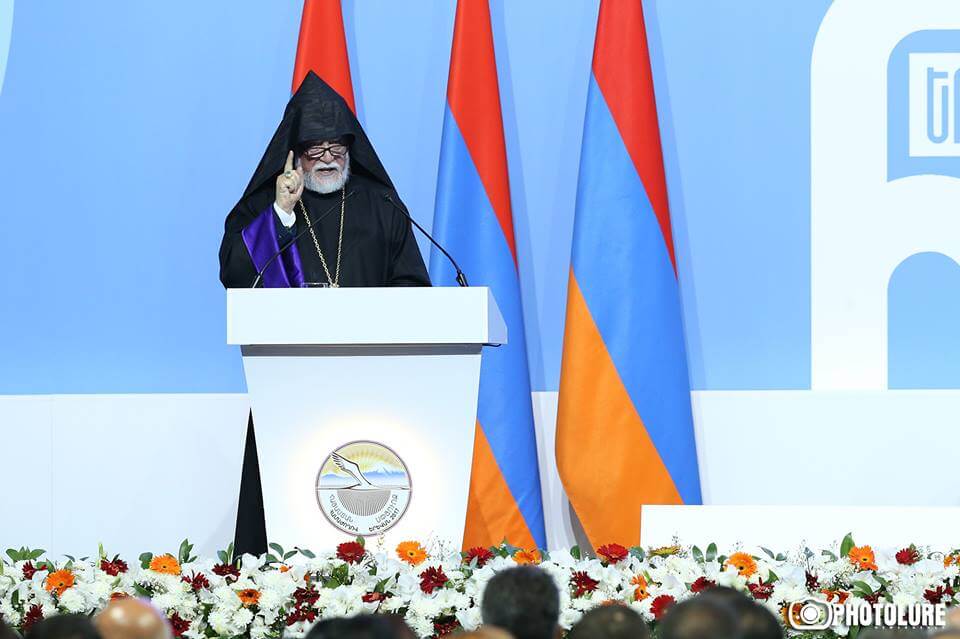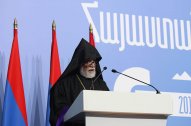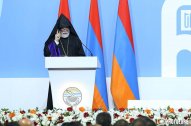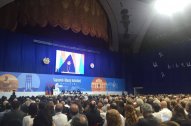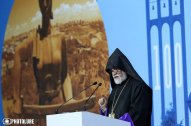His Holiness Aram I, Catholicos of the Great House of Cilicia, stressed the importance of “confidence” as one of the three key phrases in the theme of the Sixth Armenia-Diaspora Pan-Armenian Conference, “Mutual Confidence, Unity, and Responsibility.”
“Indeed, any type of cooperation in which confidence is lacking becomes false and harmful,” Aram I said after his preliminary remarks. The Catholicos then highlighted ways that mistrust has negatively affected Armenian life over the past 27 years of Armenian independence.
The sixth pan-Armenian conference opened on Sept. 18 at Yerevan’s Karen Demirjyan Complex with the presence of delegates, guests, and dignitaries, including the presidents of Armenia and Artsakh and His Holiness Karekin II, and His Holiness Aram I.
“We are at a critical crossroads of our history. Let us be realistic and honest. Armenia is emptying, and the Diaspora is wearing out. In the face of this dangerous reality, random initiatives cannot solve our problems and heal our wounds. The signs of time must be read correctly, the diagnosis must be made accurately, and appropriate decisions and effective remedies must be applied properly,” the Catholicos stressed.
Aram I noted that it is imperative to bring the Armenia-Diaspora partnership out of the narrow realm of “random financial investments and touristic visits,” and to transform it into one of the major priorities of Pan-Armenian national policy.
“With the vision of a unified and historical Armenia as the basis of our national ideology, a strong Armenia, resilient Artsakh, and an organized Diaspora must become the strategy and basic objective of our national policy. Such a national policy and ideology sustained by clear vision, will undoubtedly unite all of our people along its energy and potential, and become the driving force behind the formation and development of pan-Armenian thinking,” he said.
The Catholicos then underscored the Diaspora’s need to develop a close relationship with Armenia: “The homeland is a land and people, before it is a state and an economy,” he reminded, noting Armenia’s critical situation: a landlocked country surrounded by hostile neighbors. Aram I went on to say that it is absolutely crucial and necessary to slow the pace of emigration and to implement measures to secure population growth in Armenia.
However, he said that “What is essential is to have the wisdom, will, and commitment to find solutions to our troubles. It is expected that now, under its reformed constitution, which will ensure more transparent and accountable structures and processes, Armenia will be able to find solutions to these and other issues through correctly taking advantage of the opportunities provided by the Armenia-Diaspora collaboration.”
The Catholicos noted that Armenia and the Diaspora are not merely partners but “the integral and inseparable parts of the same nation and homeland.” He went on to explain: “It is with this perspective that the Armenia-Diaspora cooperation should be planned and implemented. Over the past 27 years, the bond that has developed between the two segments of our people, with its positive and negative aspects, must motivate our cooperation to improve and to grow. Stagnation means retreat, and retreat is unacceptable for our nation and our homeland, which are surrounded by crisis and challenges.”
“Armenia is not merely a tourist attraction, a market for business, or a passport. Shame on us if this is how we approach Armenia. Armenia is the home of all Armenians around the world who consider themselves to be Armenian. We must strengthen and flourish Armenia with all our abilities. This must be a sacred vocation of each Armenian.”
The Catholicos noted the importance of Armenia’s political and humanitarian aid to the crisis-stricken Armenian community of Syria, and considered it a significant step. He went on to stress the importance of continuing and building upon the unity displayed at the worldwide commemorations of the Centennial of the Armenian Genocide, especially with the upcoming 100th anniversary of the First Republic of Armenia, which, in his words, will “give new impetus to our national unity.”
His Holiness then proposed the establishment of a unified and single orthography with “mutual concessions,” and urged the Armenian state’s support of the protection of Western Armenian.
“Planning today means guaranteeing the future,” noted the Catholicos, underlining his approach that strengthening the foundation of our nation requires a consolidation of the people’s collective energy and the gaining of people’s trust. “Otherwise, we will continue to call out slogans within closed circles,” he said.
Urging the Armenian people not to trust the friendship of powers with their own geopolitical interests, “let us trust in our own strength and unity, our faith, and our determination,” he counseled.

